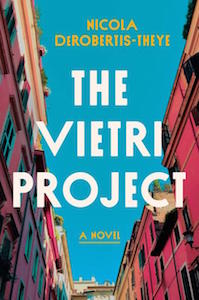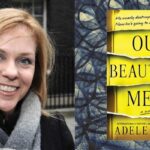
Coming of Age in a Struggling Berkeley Bookstore
Nicola DeRobertis-Theye on Finding Community Working at University Press Books
The bookstore where I worked for four years was named University Press Books. Its name appeared on a large sign above the door, but perhaps slightly too far above, because only about half of the people who visited the store called it that. About ten years before I’d started working there, Bill McClung, who with his wife Karen and a group of original investors founded the store in the 1970s, had painted in large letters just under it TEN THOUSAND MINDS ON FIRE, in reference to the subtitle of an Emerson biography by Robert Richardson, ‘”A mind on fire.” Naturally, every person walking by or entering the store assumed the name of the store was “Ten Thousand Minds on Fire.” “What a great name for a bookstore!” I heard several times a day. (One of the necessities of a customer service job: to be able to react to the same joke over and over as if it were unique and original.) Bill and Karen had done the rough math: if ten thousand people bought two books a year, the finances would work.
Everyone who knew it called it UPB, though. It was located across the street from the UC Berkeley campus (hereafter referred to by its true name, Cal), on Bancroft just below Telegraph and Sproul Plaza, following a Turkish deli and the UC hair salon, which had the cheapest wax in town. Across the street most directly was the student union and a plaza of cheap food places and the Bear’s Lair, the only campus bar, where sometimes cheers reached us during their “beat the clock” Friday special when the weather was nice and our door was propped open.
Karen and Bill had met while working at the University of California Press. They had agreed there should be a bookstore in Berkeley that would stock the more academic titles published by university presses, which most bookstores didn’t find it made economic sense to carry. A partnership of 25 people raised $35,000 and founded the store in 1974.
Our relationship to the rest of Berkeley was strange; we seemed either known and deeply beloved or completely unacknowledged. There was an informal tradition among the independent bookstores of Berkeley to honor a 10% discount for each other’s staffs, and often when I felt courageous enough to ask for it the clerk on the other end would have no idea we were a bookstore. These were years at the tail end of a good run for Berkeley’s bookstores. Four or five blocks down on Telegraph there was Cody’s and Moe’s and Shakespeare & Co. The same distance away on Shattuck were Pegasus and Border’s, widely despised as the corporate megalith. The was the anarchist bookstore in the alley between Durant and Channing, across from my shoe repair guy and the good frozen yogurt place, North Berkeley had Black Oak, and there was a Barnes and Nobel in Emeryville with the higher end shops by the bay. The bookstores contributed to the literary culture of Berkeley not only through the books they sold but also through the people they employed: the poet Brenda Hillman had worked at the store in its early years, as had Dean Young, while Jonathan Lethem had famously worked at Moe’s.
Despite our proximity to campus, most undergraduates had never heard of us. I was an undergraduate, and I’d never heard of it before my boyfriend at the time, a philosophy major, suggested I apply there for a job—it was 2007, my last year of college, and I’d spent the previous eight months working at an upscale Italian deli, dreaming of a life that did not involve regularly cleaning the meat slicer. A week after dropping off my resume, I’d interviewed and gotten the job, and worked there twenty hours a week during my last year of college.
Karen was always in the back, boxing and unboxing, seven days a week, often in her soccer clothes (she played in the same adult soccer league as my mother, it turned out). Other than the managers—five or six women in their fifties and sixties—the employees were me, Pablo, a poet straight out of the Brown MFA, Ed, who’d graduated at the same time as me from Cal and whose other job was at the Port of Oakland, and Jay, who had crazy Beethovenesque shocked-upward white hair and lived above the store and had been working on a philosophy dissertation on Foucault for twenty years. Jay had the slowest, Sunday shift.
After the books, the main appeal to working in a bookstore is the people. People who buy books! What a special category of souls.
Margins were tight. Some days the store brought in less than $1,000 gross—on bleak days we would tally $700, $800 when running the till—so often there was only one person working in the store. When ringing up books the practice was to bring the spines under the front desk and align them against a “demagnifier”—except there was no such thing. The security cameras and metal detector, too, were just for show. The most frequently shoplifted sections were Political Philosophy (obviously) and Caribbean studies. You learned never to tell a customer on the phone the Gramsci was in stock before finding it on the shelf.
After I graduated, a friend and I decided to travel around South America for a few months, before getting real jobs. In September, the economy crashed. I came back from South America in March, having spent all of my savings and in credit card debt. I applied for every job I could find, but the country was in a recession, and over the summer I worked my high school job at a summer camp. Then two closing shifts opened up at the bookstore—seven hours a week. I would bike down from the Oakland hills to the Berkeley campus, sometimes feeling bold enough to have one iPod ear bud in listening to MGMT’s Kids or the Life Aquatic soundtrack on repeat.
*
By the fall, the new manager they had hired to run the events had just given birth. All of the women who’d been with the store from the 70s assumed she’d do it as Karen had done with her two children—baby strapped to her chest while working the cash register, toddler in a play pen under a book display table. But she decided to stay home with the baby, so I became the events coordinator. My training was simple: go through the UP publisher catalogs, circle when the author was a professor at Berkeley, email them as ask if they’d like to have an event when the book came out. We did events with all of the Berkeley intellectual royalty: George Lakoff, Judith Butler, Robert Hass, Alice Walker.
After the books, the main appeal to working in a bookstore is the people. People who buy books! What a special category of souls. It was a customer service job, one or two customers were so mean they made me cry, but most were wonderful. There was a man who repeatedly ordered the Historical Atlas of Armenia, published by the University of Chicago Press at $175, it was almost always on order for him or waiting in the holds shelf for him to pick up, he had purchased ten or twelve of them in total by the time I started working there. Once I got the courage to ask him what he did with them. I give them away, he said. I want people to know.
*
Retail was tough on Telegraph. The joke—which often was just reality—was that every time something went out of business in those years it was replaced by a frozen yogurt store. The other bookstores had started dropping off—first Cody’s expanded and burned out like a supernova, then Borders closed in 2011.
Bill had all kinds of ideas for keeping the store afloat. He created “Slow Reading Dinners”: For $45 ($15 for students), attendees could gather for dinner prepared by Erick, the Spanish chef from the café next door. They would bring a short piece of writing—paragraph, page, or poem—that they thought should be read slowly. Martin, who was a partner in the bookstore and owned the collection of antique books that resided in the loft, foraged for mushrooms regularly, and the first of these dinners featured local chanterelles from the Berkeley and Oakland hills. Bill bought rosé from Kermit Lynch—this was 2009 and I had never had a dry rose before, a revelation. (I suspect the math did not work out exactly with the wine.) We would eat, drink, go around in the circle and read, and discuss. I was twenty-three and too young to know how special this all was.
It was becoming clear that if there was an economic model with which the bookstore could survive, it was not a strictly capitalist one.
Bill next decided we should found a nonprofit to support the Arts and Letters at the bookstore and the classical CD store next door, which often hosted performances by local string quartets. This would allow us to collect tax-deductible donations for the bookstore, the nonprofit could contribute towards the events and programs at the store. It was becoming clear that if there was an economic model with which the bookstore could survive, it was not a strictly capitalist one.
We tried a lot of things. Before the nonprofit, there were frequent buyer programs for customers, a “Friends of UPB” drive where we flat out asked supporters to donate money. We begged professors to order their course books with us instead of the campus bookstore, and a lot of them did. I applied to presses for coop funds to support every event we had, we partnered with nonprofit presses, bought used books on which the margins were better, acquired the libraries of professors recently retired or deceased, sold books on Abebooks and other websites. But increasingly, it wasn’t enough.
*
After college, my only ambition had been to be to travel. Then I came back from South America and it slowly occurred to me over the early years of my twenties that I would need to build a life. The only things I had ever wanted to do, to write and to travel, felt very far away. Those years after college were in some ways difficult for me, as I suspect they were for many academically achieving elder millennials. For so long I’d had a series of goals arranged: high school, then college, and suddenly after college an entire life stretched in front of me that I had no idea how to shape, or no faith that with the puny abilities, that I would be able to shape it.
But there was something swirling in my head, practically in front of my eyes, I could hear sentences echoing as I walked, and I had to write them. So on my days off, when I wasn’t doing chores and grocery shopping and watching marathons of SVU while folding laundry, I was trying to peck out words on to my laptop. The thing I was working on, I was realizing, was going to be a book.
I decided to apply to MFA programs, I wanted to finish the book, go all in on this ill-advised career track. By the spring I’d gotten into four MFA programs, three in the Bay Area, but none of those with any funding. I saw that if I stayed I would keep my job at the bookstore, classes were often at night and would be easy to fit into my schedule, I could have lobbied to be made a manager, worked to expand the nonprofit with Bill, given my life over to running the store. But aside from studying abroad I had never lived outside of the East Bay, and I wanted to build my own life. I needed to leave home.
The bookstore threw me a goodbye party in the back patio. Erick made the best sangria I have to this day ever tasted. I moved to North Carolina, where I lived for three years. I wrote the book I wanted to write. No one published it, but I survived. After I finished my MFA I moved to New York and started a new book, a novel, though I’d written the opening pages while still working in the store. In fact, they were set in the store itself.
I left the bookstore in 2011, but at least once a year I would visit when home for Christmas, I bought books, for myself and as gifts, refused the discount. I sent my mother there. I would get updates—they had recruited more investors, expanded the group to 50. They started hosting classics and reading groups in back room. In 2013, two years after I’d left, they sold the building and they seemed optimistic, the buyer was motivated to keep them in place, the cash influx bought them some time. They turned over the back patio to Café Ohlone, dedicated to the cuisine of the indigenous Ohlone, which became quite successful.
It takes so much time to build a community. It takes a second for them to fall apart.
In the meantime, I finished the book, the one whose early pages were set in the store, got an agent, and a publisher offered to publish it—all of this is easy to write in a sentence; it took years and years. In the summer before the book was published, four months into the Covid lockdown, I’d just finished copyedits when I saw the Facebook post: University Press Books had closed. They were hoping it was temporary, hoped to find a smaller space with cheaper rent and reopen post-pandemic. It had been so many years on the edge: I really had begun to wonder if maybe it could continue forever.
Independent bookstores have been hit so hard by the pandemic, and I can’t help thinking about what are we losing, each time we lose one. A shopping experience, certainly—Amazon algorithms can never replicate the serendipity of a book catching your eye, one that you might never usually seek out, but of course everyone knows bookstore really make the money on the cards, the merch (we sold “reading is sexy” tees and bumper stickers), and the kids’ books—despite our academic bent, one of our bestselling books in 2007 was Twilight. There’s the convenience, of course—more than one Berkeley adjunct or GSI on the way to teach a class, having forgotten the book they were teaching at home had popped in to grab Things Fall Apart, or Gender Troubles, but there is also inconvenience—customers were consistently shocked that it took 2-3 weeks for us to order books from University Presses. I think really, what they dissolve is a community. It takes so much time to build a community. It takes a second for them to fall apart.
Of course I wonder if I should have stayed, should have thrown myself into the various ways we were trying to save the bookstore, and if I am honest I can easily picture that alternate life that would have spun out from the decision to stay. It’s true I chose a different life, chose my own book, but it’s a book I could not have conceived of or written without my time working for that bookstore. Even before I learned it was closing, I dedicated the book to it.
_________________________________________

The Vietri Project by Nicola DeRobertis-Theye is available now via Harper Books.
Nicola DeRobertis-Theye
Nicola DeRobertis-Theye was recently chosen as one of the Center for Fiction’s NYC Emerging Writers Fellows. She is a native of Oakland, California and has an MFA in Creative Nonfiction from the University of North Carolina, Wilmington. Her work has appeared in AGNI and Treehouse Magazine.



















